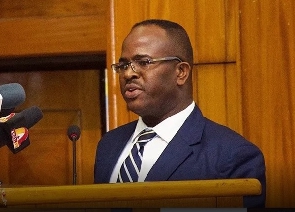 Chief Executive Officer of the Ghana Chamber of Mines, Dr. Sulemanu Koney
Chief Executive Officer of the Ghana Chamber of Mines, Dr. Sulemanu Koney
Sustained investment in exploration efforts remains the surest way of ensuring long-term growth and sustainability for the mining sector, Chief Executive Officer (CEO)-Ghana Chamber of Mines, Dr. Sulemanu Koney, has said; emphasising the need for a conducive environment and policy initiatives to facilitate greater exploration.
“Effective and efficient exploration is the foundation of a thriving mining industry. It’s not solely about immediate income but the groundwork for future development,” the Chamber’s CEO said in an interview with B&FT.
While the country’s exploration budget rose substantially from US$107million in 2021 to US$114 million in 2022, high taxes remain a significant impediment. This directly limits companies’ capacity to sufficiently allocate funds toward the critical drilling and analysis activities fundamental to exploration.
Mr. Koney said taxes on exploration activities should be addressed, as they are not only affecting discovery of new minerals but reducing the country’s attractiveness as a preferred destination for mining investment on the continent.
With respect to Africa, exploration spend increased 12 percent to US$1.3billion in 2022; driven by countries like Mali, DR Congo, Côte d’Ivoire and Ghana. However, investment in Ghana has declined over recent years. This has serious implications, given mining’s fiscal and forex revenue importance.
Ghanaians hold a sizable proportion of local exploration licences but struggle to raise capital for high-risk and high-capital-intensive activities. “Given that Ghanaians hold a large share of exploration mineral rights, they stand to benefit if the hurdles of exploration in terms of upfront costs are reduced,” the Chamber of Mines outlined in its 2023 industry report.
The relevance of exploration is to ensure a pipeline of future viable projects, as this is the single-most critical activity that guarantees a continuous production of minerals and discovery of new mineral resources – to supplement production from existing mines or replace the output of mines whose economic ore body is exhausted.
However, according to the Chamber of Mines, exploration investment in Ghana has declined significantly in recent years. This is alarming for a country where mining is critical for forex and fiscal revenue generation.
“Frustrating exploration with high taxes before commercial viability isn’t justifiable,” asserted Dr. Koney. “Investments benefit the companies, but also provide valuable geological data even if unsuccessful.”
The mining industry relies heavily on finite mineral resources, making new discoveries imperative for long-term sustainability. Concurrent exploration, development and mining ensures smooth transitions, but bureaucratic delays in securing permits and licences often hinder progress.
Dr. Koney urged “an incentive scheme to reduce exploration costs and attract critical investments into this high-risk business”. Exempting VAT on major expenditures could improve cash flows and competitiveness.
Such delays also financially impact smaller exploration firms despite promising discoveries. Lowering barriers and addressing taxation could spur investment, advised Dr. Koney. Favourable regimes like that in Canada demonstrate such incentives’ long-term economic merits.
Dr. Koney also emphasised localising the entire mining value chain, including manufacturing and value addition.
“There’s untapped potential for local manufacturing, given the captive market within industry,” he remarked. “We need action in converting discussions into investments to nurture competitive local growth.”
Overall sector performance was mixed in 2022. Gold and diamond production rose substantially, but bulk minerals declined. Attributable gold output increased 32% in 2022 to 3.7 million ounces, owing to large- and small-scale growth.
With over 3.2 million ounces projected from Chamber members in 2023 plus small-scale contributions, total 2023 gold output is forecast between 3.3-3.5 million ounces. Ghana Manganese Company also plans to raise production from 3.2 to 5 million tonnes.